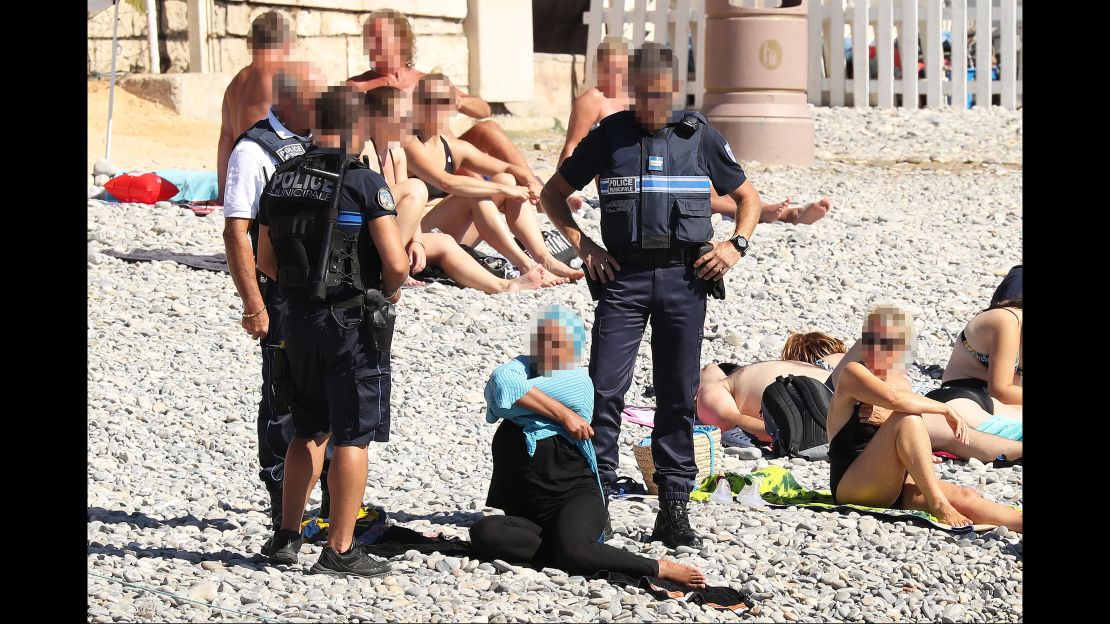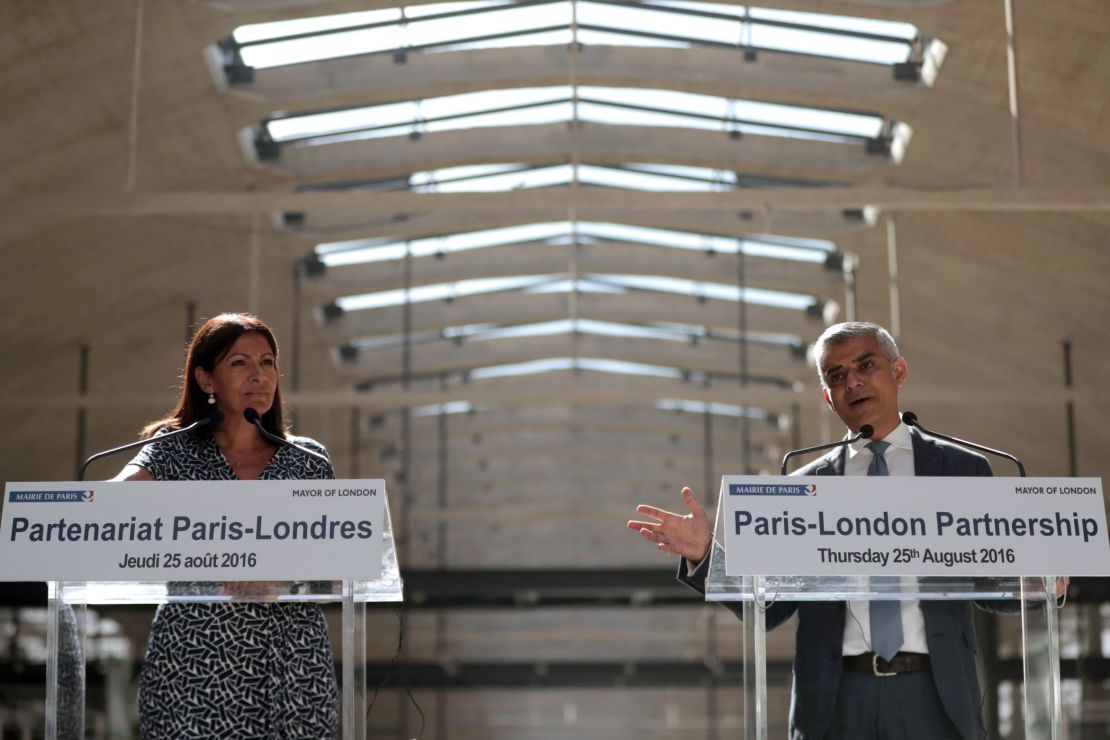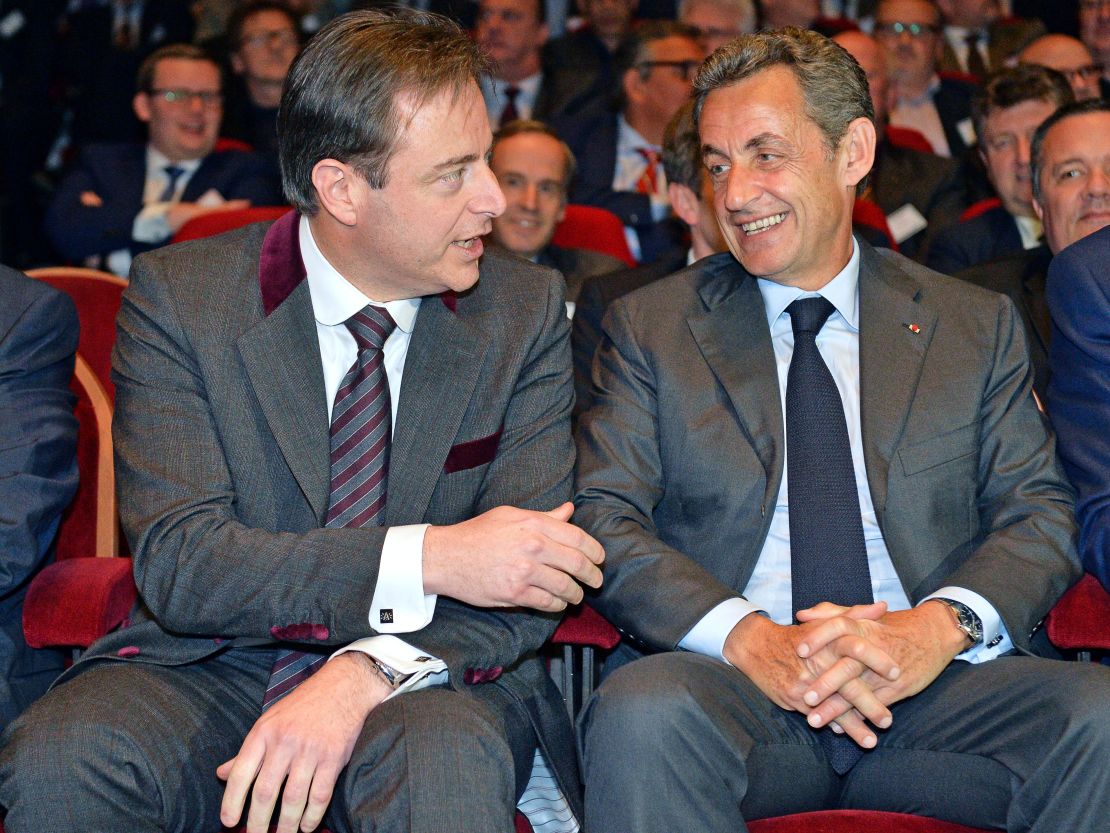Story highlights
Activists hold beach party in protest outside French Embassy in London
Author J.K. Rowling critical of Nicolas Sarkozy's comments on burkinis
Activists created a makeshift beach Thursday outside the French Embassy in London as part of a demonstration against France’s burkini ban.
So far 15 French towns have banned the burkini, a full-length swimsuit that covers the whole body except for the face, hands and feet. Officials say the ban on the outfit – mostly worn by Muslim women – is a response to growing terror concerns.
Wearing everything from bikinis to burkas, and even priest cloaks, demonstrators in London built sand castles and brandished signs saying: “Wear what you want.”
“I think it’s ridiculous,” said event organizer Fariah Syed of the burkini ban. “No one, regardless of their religion and race, should be told what they should wear and where they can wear it.
“It’s important to show solidarity because of the spread of Islamophobia around the globe – especially in France.”
Syed was joined by bikini-wearing Natalie, who asked that her last name not be used. “Women ought to be able to make their own choice about what they wear – whether that be a bikini or burkini, it makes no difference,” she said.
READ: Dolce & Gabbana debuts line of hijabs and abayas
Meanwhile, Jenny Dawkins, a Church of England priest, wore her traditional cloaks after hearing about Muslim women “being treated in a way which was totally unacceptable and must have been very intimidating and frightening.”
Dawkins said she was moved to attend the demonstration after seeing pictures of French police overseeing a woman remove part of her clothing on a beach in Nice.
“I think it’s a frightening image,” she said of the photos that emerged Wednesday. “I find it quite chilling to see an image of a woman surrounded by men with guns being told to take her clothes off.”

Read more: Police in Nice force woman to remove part of clothing
J.K. Rowling takes aim at Sarkozy
Separately, best-selling British novelist J.K. Rowling criticized former French President Nicolas Sarkozy’s comments that wearing a burkini was a “provocation.”
“The burkini affair, everybody sees it is a provocation, a provocation for the service of a project of radicalized political Islam,” Sarkozy, a presidential hopeful in 2017, said in a televised interview Wednesday with TF1.
The “Harry Potter” author hit back in a tweet, saying: “So Sarkozy calls the burkini a ‘provocation.’ Whether women cover or uncover their bodies, seems we’re always, always ‘asking for it.’”
H&M’s latest look: Hijab-wearing Muslim model stirs debate
London mayor: Women have right to choose
London Mayor Sadiq Khan also weighed in on the burkini debate during a press conference Thursday with his Paris counterpart, Anne Hidalgo.

“I’m a proud feminist,” said Khan, adding: “I don’t think anybody should tell women what to wear or what they shouldn’t wear.”
Analysis: Why are the burqa and burkini being banned?
Antwerp mayor likens burkini to ‘a tent’

Asked in an interview this week with Belgium newspaper De Morgen if he would be implementing a ban on burkinis, Antwerp Mayor Bart De Wever said it looks as if it’s a question of taste – “like wearing white socks with sandals.”
“I’ve read the craziest left-wing opinions about it,” he said.
“If I understand it correctly, we have to protect the wearing of the Burkini as the most important milestone in the emancipation of the woman since the bra burnings of the Dolle Mina in the 1970s,” he told the paper, referring to a Dutch feminist group.
“In the past, a Muslim woman could only sit in a tent on the beach. Now she’s allowed to put that tent on and go into the ocean with it. We’re improving.”
Cartoons from the Muslim world
Sudanese artist Khalid Albaih gave his unique take on the ban, depicting a women being ordered to undress in France, and uncover in other parts of the world.
The political cartoonist, who lives in Qatar, has been published in such news outlets as The Atlantic, The Guardian and Al Jazeera.
What’s the view from France?
Burqa, hijab, niqab: What's what?
The bans on overtly religious clothing on French beaches follow a series of terror attacks in the country – including a truck rampage in Nice that killed 84, and the stabbing of an 86-year-old priest in northern France, both last month.
France already became the first European country to ban wearing burqas in public in 2011.
And much like the recent burkini bans, opinion in the country is divided between those who see the laws as an infringement on religious freedom, and those who view the Islamic dress as inconsistent with France’s rigorously enforced secularism.
RELATED: The hijab-wearing Barbie who’s become an Instagram star
Hervé Lavisse, president of the Cannes-Grasse section of the Human Rights League, told CNN the bans would be counterproductive because “instead of appeasing people, it will inflame tensions.”
But Valérie Boyer – who represents the Bouches-Du-Rhone region as a member of the center-right Les Republicains – previously said in a statement: “Burka, chador, abaya, niqab, hijab, the name doesn’t matter.
“They constitute a confinement of the gender, a negation of the person, a prohibition of liberty, a prohibition equality, a prohibition of fraternity.”
CNN’s Erin McLaughlin, Radina Gigova and Laila Ben Allal contributed to this report.






